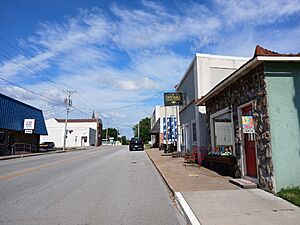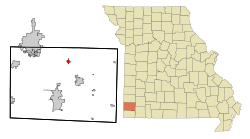Diamond, Missouri facts for kids
Quick facts for kids
Diamond, Missouri
|
|
|---|---|

Downtown Diamond in July 2024
|
|

Location of Diamond, Missouri
|
|
| Country | United States |
| State | Missouri |
| County | Newton |
| Area | |
| • Total | 0.75 sq mi (1.94 km2) |
| • Land | 0.75 sq mi (1.93 km2) |
| • Water | 0.00 sq mi (0.00 km2) |
| Elevation | 1,161 ft (354 m) |
| Population
(2020)
|
|
| • Total | 831 |
| • Density | 1,112.45/sq mi (429.81/km2) |
| Time zone | UTC-6 (Central (CST)) |
| • Summer (DST) | UTC-5 (CDT) |
| ZIP code |
64840
|
| Area code(s) | 417 |
| FIPS code | 29-19432 |
| GNIS feature ID | 2396686 |
Diamond is a small city in Newton County, Missouri, in the United States. It is located southeast of Joplin. In 2020, about 831 people lived there. Diamond is famous for being the birthplace of George Washington Carver, a very important scientist.
Contents
History of Diamond
The area where Diamond is now was once a wide, grassy prairie. Parts of this original grassland still exist today. The town started with a log house built by Dr. and Mrs. Leathers.
At first, the town was called Center. A blacksmith's shop, where people could get metal items made or fixed, opened in 1878. The town changed its name to Diamond in 1883. This happened when a post office was opened there. The name "Diamond" came from a piece of land nearby that was shaped like a diamond. In the past, mining was the main industry in Diamond.
Geography and Location
Diamond is located on the Diamond Grove Prairie. You can find it along Alt. Route 71. It is about 13 miles south of Carthage. It is also about nine miles north of Neosho.
The George Washington Carver National Monument is just two miles to the west. This monument is a special place that honors George Washington Carver. According to the United States Census Bureau, the city covers a total area of 0.75 square miles (1.94 km2). All of this area is land.
Diamond's Climate
| Climate data for Diamond, Missouri (1991–2020 normals, extremes 1993–present) | |||||||||||||
|---|---|---|---|---|---|---|---|---|---|---|---|---|---|
| Month | Jan | Feb | Mar | Apr | May | Jun | Jul | Aug | Sep | Oct | Nov | Dec | Year |
| Record high °F (°C) | 76 (24) |
86 (30) |
88 (31) |
92 (33) |
92 (33) |
103 (39) |
108 (42) |
110 (43) |
104 (40) |
91 (33) |
86 (30) |
78 (26) |
110 (43) |
| Mean maximum °F (°C) | 71.0 (21.7) |
72.0 (22.2) |
80.1 (26.7) |
85.1 (29.5) |
87.5 (30.8) |
93.3 (34.1) |
97.8 (36.6) |
99.3 (37.4) |
94.1 (34.5) |
86.2 (30.1) |
77.5 (25.3) |
69.6 (20.9) |
99.9 (37.7) |
| Mean daily maximum °F (°C) | 46.0 (7.8) |
50.5 (10.3) |
59.5 (15.3) |
68.8 (20.4) |
76.3 (24.6) |
85.1 (29.5) |
89.9 (32.2) |
90.0 (32.2) |
82.5 (28.1) |
71.6 (22.0) |
59.1 (15.1) |
49.0 (9.4) |
69.0 (20.6) |
| Daily mean °F (°C) | 34.3 (1.3) |
38.4 (3.6) |
47.1 (8.4) |
56.2 (13.4) |
64.9 (18.3) |
74.0 (23.3) |
78.4 (25.8) |
77.4 (25.2) |
69.9 (21.1) |
58.2 (14.6) |
46.9 (8.3) |
37.6 (3.1) |
56.9 (13.8) |
| Mean daily minimum °F (°C) | 22.5 (−5.3) |
26.3 (−3.2) |
34.7 (1.5) |
43.6 (6.4) |
53.5 (11.9) |
62.9 (17.2) |
66.9 (19.4) |
64.9 (18.3) |
57.2 (14.0) |
44.8 (7.1) |
34.7 (1.5) |
26.2 (−3.2) |
44.8 (7.1) |
| Mean minimum °F (°C) | 5.4 (−14.8) |
8.3 (−13.2) |
17.1 (−8.3) |
26.1 (−3.3) |
38.2 (3.4) |
50.7 (10.4) |
56.5 (13.6) |
52.5 (11.4) |
42.7 (5.9) |
28.5 (−1.9) |
17.2 (−8.2) |
12.0 (−11.1) |
1.3 (−17.1) |
| Record low °F (°C) | −12 (−24) |
−16 (−27) |
3 (−16) |
16 (−9) |
31 (−1) |
44 (7) |
47 (8) |
47 (8) |
31 (−1) |
16 (−9) |
6 (−14) |
−4 (−20) |
−16 (−27) |
| Average precipitation inches (mm) | 1.91 (49) |
2.24 (57) |
3.54 (90) |
5.24 (133) |
6.71 (170) |
5.49 (139) |
3.80 (97) |
3.48 (88) |
4.48 (114) |
3.89 (99) |
3.58 (91) |
2.51 (64) |
46.87 (1,190) |
| Average precipitation days (≥ 0.01 in) | 3.8 | 5.0 | 7.3 | 8.5 | 9.4 | 8.4 | 7.1 | 6.3 | 6.9 | 6.4 | 6.6 | 4.8 | 80.5 |
| Source: NOAA (mean maxima/minima 2006–2020) | |||||||||||||
People Living in Diamond (Demographics)
| Historical population | |||
|---|---|---|---|
| Census | Pop. | %± | |
| 1950 | 405 | — | |
| 1960 | 453 | 11.9% | |
| 1970 | 608 | 34.2% | |
| 1980 | 766 | 26.0% | |
| 1990 | 775 | 1.2% | |
| 2000 | 808 | 4.3% | |
| 2010 | 902 | 11.6% | |
| 2020 | 831 | −7.9% | |
| U.S. Decennial Census | |||
In 2010, there were 902 people living in Diamond. These people lived in 372 households. A household is a group of people living together in one home. About 250 of these households were families.
The city had about 1203 people per square mile. Most of the people (94%) were White. There were also smaller numbers of African American, Native American, and Asian residents. About 1.9% of the population was Hispanic or Latino.
Many households (36%) had children under 18 living with them. Almost half (47.8%) were married couples. About 12.3% of households had someone living alone who was 65 years old or older. The average age of people in Diamond was 35 years.
Famous Person from Diamond
- George Washington Carver – He was a brilliant scientist, botanist (someone who studies plants), educator, and inventor. He was born near Diamond around 1864. You can visit his childhood home, which is now the George Washington Carver National Monument. It is open to the public.
See also
 In Spanish: Diamond (Misuri) para niños
In Spanish: Diamond (Misuri) para niños
 | William M. Jackson |
 | Juan E. Gilbert |
 | Neil deGrasse Tyson |

